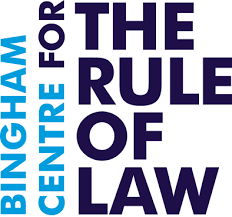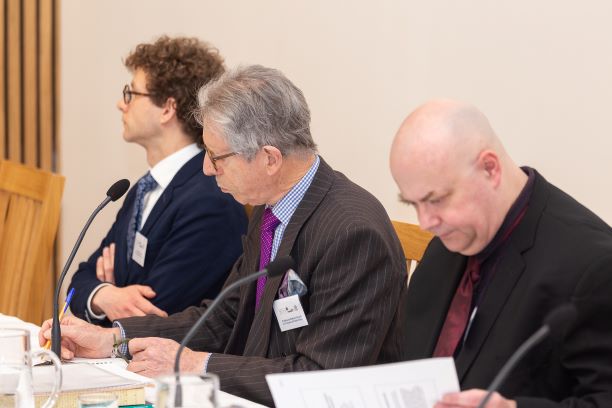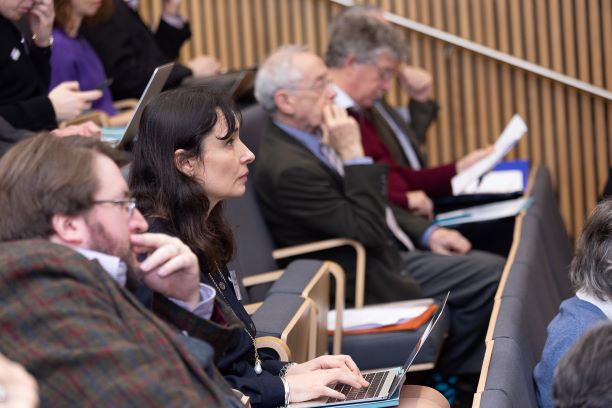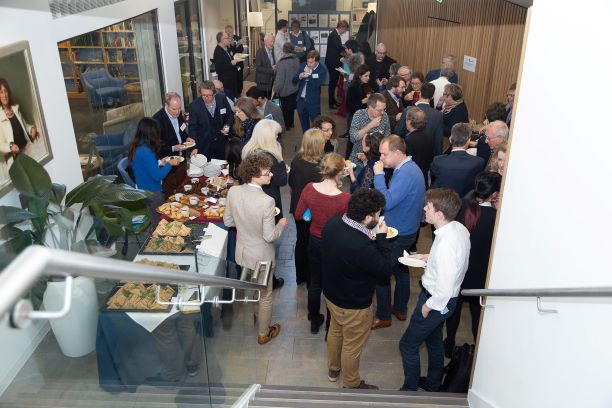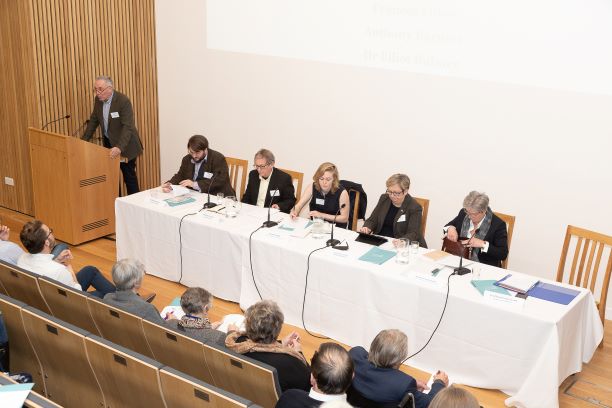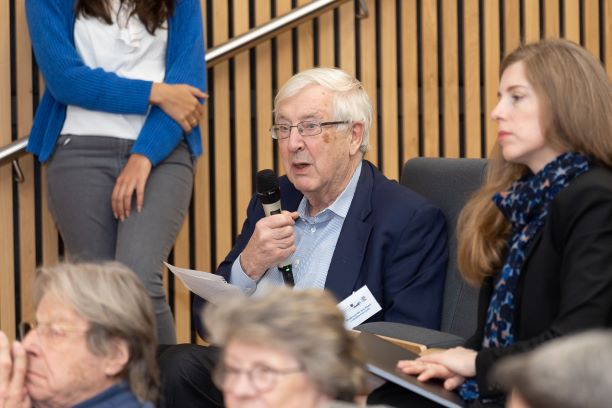Remaking the UK Constitution
Watch Recording of the Conference Flagship Events at the Bonavero Institute
(individual panel recordings and presentations listed below)
Brexit has generated a widespread recognition on all sides of the debate that the UK is in the midst of one of the greatest constitutional upheavals in its history. Consequently, there is growing interest across and outside the political parties in revisiting some fundamental aspects of the UK constitution. 
Remaking the UK Constitution conference discussed how to remake the UK constitution in a democratically legitimate manner. Discussion focussed on constitutional processes which would be capable of attracting broad support: a prerequisite of lasting constitutional design. The aim was to engage in an inclusive discussion of how the constitution could be remade, and facilitate further engagement with whether it should be and what constitutional changes might be necessary and desirable (questions that should be decided by the process itself).
The conference (held 22nd & 23rd February 2019) was hosted jointly by the Bonavero Institute of Human Rights, The Bingham Centre for the Rule of Law and The Constitution Unit at University College London. It brought together senior politicians, leading scholars, legal practitioners, policy makers, civil servants, and leading journalists to create an accessible and influential set of debates and exchanges. It has been recorded to ensure that it becomes a public event that is informed by arguments and information of the highest intellectual quality.
Discussions at the conference will be distilled into a public report – Remaking the UK Constitution – to be co-published by Bonavero, Bingham and the Constitution Unit. The report would be published a short time after the conference with a view to influencing public debate. Stuart White and Anthony Barnett will edit a subsequent edited collection of the papers presented.
List of Speakers
Friday 22nd February 2018
Session 1: Introductory Framing Session:
View the recording of Session 1 View presentations from Session 1
Chair: Professor Kate O’Regan, director of the Bonavero Institute of Human Rights and judge of the Constitutional Court of South Africa (1994 - 2009).
Speakers:
- Professor Robert Hazell, founder of the Constitution Unit at UCL, Professor of Government and the Constitution in UCL’s School of Public Policy.
- Associate Professor Stuart White, Fellow in Politics at Jesus College, Oxford. Research areas: philosophical and institutional issues in the relationship between democracy, property and citizenship.
- Dr Alan Renwick, The Constitution Unit, University College London
Session 2: Brexit and the UK Constitution
View the recording of Session 2 View presentations from Session 2
Chair: Lord David Anderson QC (Brick Court Chambers), former Independent Reviewer of Terrorism Legislation, cross-bench “People’s Peer”.
Panellists:
- Rt Hon Gisela Stuart, Constitutional Reform Group Steering Committee member and Chair of Wilton Park
- Rt Hon Joanna Cherry QC, Member of Parliament for Edinburgh South West
- Frances Foley, Project Direct, Citizens' Convention on UK Democracy
- Anthony Barnett, Co-Founder, openDemocracy
- Dr Elliot Bulmer, Senior Programme Officer, Constitution Building Programme of the International Institute for Democracy and Electoral Assistance; specialises in institutional design, particularly in Westminster-derived contexts.
Session 3: Thinking about constitution-making in the four constituent countries of the United Kingdom
View the recording of Session 3
View presentations from Session 3 - Part 1 View presentations from Session 3 - Part 2
Chair: Dr Paul Gillespie, Deputy Director, Institute of British-Irish Studies, School of Politics and International Relations, University College Dublin, Irish Times columnist.
Panellists:
- Wales: Professor Laura McAllister, Professor at the Wales Governance Centre, Cardiff University. Research areas: devolution and constitutional matters in Wales.
- England: Sunder Katwala, Director, British Future, an independent, non-partisan thinktank engaging people’s hopes and fears about integration and migration, opportunity and identity, so that we share a confident and welcoming Britain, inclusive and fair to all.
- Northern Ireland: Dr Robin Wilson, general editor of Social Europe and an expert adviser to the Council of Europe on intercultural integration and author of Meeting the Challenge of Cultural Diversity in Europe: Moving Beyond the Crisis (Edward Elgar, 2018).
- Scotland: Lesley Riddoch, Scottish journalist, author, campaigner and Director of the policy group Nordic Horizons.
Saturday 23rd February
Session 4: The flexibility of a new constitution
View the recording of Session 4 View presentations from Session 4
Chair: Professor Jeff King, Professor of Law at the Faculty of Laws, University College London, teaches public law and constitutional theory.
Panellists:
- Professor Dr Matthias Mahlmann, Chair of Philosophy and Theory of Law, Legal Sociology, and International Public Law, University of Zurich. Research areas: Comparative Constitutional Law, International Law, Legal philosophy, Law and Society.
- Dr Silvia Suteu, UCL Faculty of Laws, University College London
- Professor Richard Bellamy, Professor, University College London; Director of the Max Weber Programme, European University Institute
- Professor Dr Maartje de Visser, Singapore Management University
- Professor Peter C. Oliver, Full Professor and Vice Dean Research, Faculty of Law, University of Ottawa. Works in the field of constitutional law, history and theory -- federalism, Commonwealth, sovereignty, constitutional amendment.
Session 5: Citizens’ Assemblies and other forms of Mini-Publics
View the recording of Session 5
View presentations from Session 5 - Part 1 View presentations from Session 5 - Part 2
Chair: Adam Ramsay, Co-Editor, openDemocracy
Panellists:
- Professor David Farrell, MRIA, Head of School of Politics and International Relations, University College Dublin. Former research director of the Irish Constitutional Convention (2012-14) and research leader of the Irish Citizens’ Assembly (2016-18).
- Professor Graham Smith, Centre for the Study of Democracy, University of Westminster. Works on democratic theory and practice, with a particular specialism in randomly-selected mini-publics.
- Dr Arianna Giovannini, Senior Lecturer in Local Politics and Deputy Director of the Local Governance Research Centre at the Department of Politics and Public Policy, De Montfort University. Research areas: territorial and local politics, governance rescaling, devolution and citizens’ engagement in the UK and in comparative perspective.
- Dr Udit Bhatia, Junior Research Fellow, Jesus College and academic affiliate, Bonavero Institute of Human Rights, University of Oxford.
Session 6: Constitutional Conventions
View the recording of Session 6
View presentations from Session 6 - Part 1 View presentations from Session 6 - Part 2
Chair: Dr Udit Bhatia, Junior Research Fellow, Jesus College and academic affiliate, Bonavero Institute of Human Rights, University of Oxford. Research areas: democratic theory, social epistemology, and constitutional law.
Panellists:
- Professor Eirikur Bergmann, Professor of Politics, Bifrost University, Iceland. Writes mainly on Nationalism, Populism, European Integration, Icelandic Politics and on Participatory Democracy, author of three novels published in Icelandic and member of the Icelandic Constitutional Council in 2011.
- Associate Professor Hélène Landemore, Department of Political Science, Yale University
- Professor Jeff King, Professor of Law at the Faculty of Laws, University College London, teaches public law and constitutional theory.
- Professor Dr Jon Elster, Robert K. Merton Professor of Social Science, Columbia University, Professeur honoraire, Collège de France, currently working on a comparison between the Federal Convention (1787) and the first French constituent assembly (1789-91)
- Professor Roberto Gargarella, Professor of Political Philosophy and Constitutional Theory, Universidad de Buenos Aires/ Di Tella. Senior Researcher at CONICET
Closing remarks by Murray Hunt, Director, Bingham Centre for the Rule of Law.

